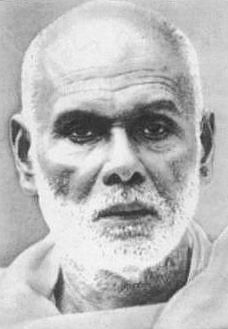
Narayana Guru
Sree Narayana Guru (IPA: [nɑːrɑːjɐɳɐ guˈru]) (20 August 1856 – 20 September 1928)[1] was a philosopher, spiritual leader and social reformer in India. He led a reform movement against the injustice in the caste-ridden society of Kerala in order to promote spiritual enlightenment and social equality.[2] A quote of his that has become popular: "one caste, one religion, and one god for all human beings". He is the author of the Advaita poem Daiva Dasakam, which is one of the most used poem in Kerala for community prayer.[3]
For the 1986 Indian Malayalam film, see Sree Narayana Guru (film).
Narayana Guru
20 August 1856
20 September 1928 (aged 72)
- Madan Asan (father)
- Kuttiyamma (mother)
Legacy[edit]
Fight against casteism[edit]
Casteism was practised in Kerala during the 19th and early 20th centuries and the backward castes such as Ezhavas and other untouchable castes like Paraiyars, adivasis and Pulayars had to suffer discrimination from the upper caste community.[17] It was against this discrimination that Guru performed his first major public act,[5] the consecration of Siva idol at Aruvippuram in 1888. Overall, he consecrated forty five temples across Kerala and Tamil Nadu..His consecrations were not necessarily conventional deities; a slab inscribed with the words, Truth, Ethics, Compassion, Love,[18] a vegetarian Shiva, a mirror and a sculpture by an Italian sculptor were among the various consecrations made by him.[19] He propagated the ideals of compassion and religious tolerance and one of his noted works, Anukampadasakam, extols various religious figures such as Krishna, The Buddha, Adi Shankara, Jesus Christ.[20]
In popular media[edit]
The life of Narayana Guru has been portrayed in a number of movies starting with the 1986 film Sree Narayana Guru,[54] made by award-winning director P. A. Backer.[55] Swamy Sreenarayana Guru, an Indian Malayalam-language film directed by Krishnaswamy, released the same year. Almost a decade and a half later, R. Sukumaran made a film on the life of Guru, titled Yugapurushan[56] in 2010 with Thalaivasal Vijay playing the role of Guru and the film also featured Mammootty and Navya Nair.[57] Brahmashri Narayana Guru Swamy is a Tulu film made in 2014 by Rajashekar Kotian on Guru's life and the film was the 50th film made in the language.[58] His life during the eight years he spent at Maruthwamala (also known as Marunnumamala) has been adapted into a docufiction, titled Marunnumamala and the film was released by Pinarayi Vijayan, the chief minister of Kerala on 9 August 2016.[59][a]
In 2016, Kerala High court observed that the statue of Sree Narayana Guru cannot be treated as a Hindu deity.[61][62]
Death[edit]
Narayana guru attained samadhi at Sivagiri, Kerala. The cause of death was indigestion and prostate inflammation. He had told all the great physicians and disciples of that time who came to treat him that the Guru had approached his samadhi in advance and that the ashram should be well looked after and that everyone should live as good people.. (January 18, 1928) The special public meeting of the SNDP meeting held at Kottayam was the last public ceremony attended by Narayana guru.
In 1927, naturopathy was carried out in Mangatukodi and Kandachira on the banks of Ashtamudikayal along with Pazhavila Chattambiasan. He was bedridden for a long time suffering from senile disease but was treated by many great doctors but could not cure the disease completely. He died during meditation in the presence of devotees on 20 September 1928 (Malayalam year 1104 Kanni 5). It was just three weeks after his 72nd birthday. The body was laid to rest in Sivagiri, Kerala Mathvalap. Today there is a hall with his statue.